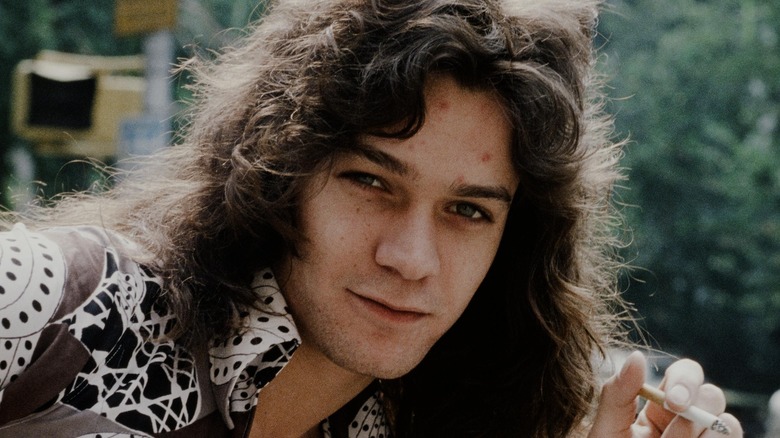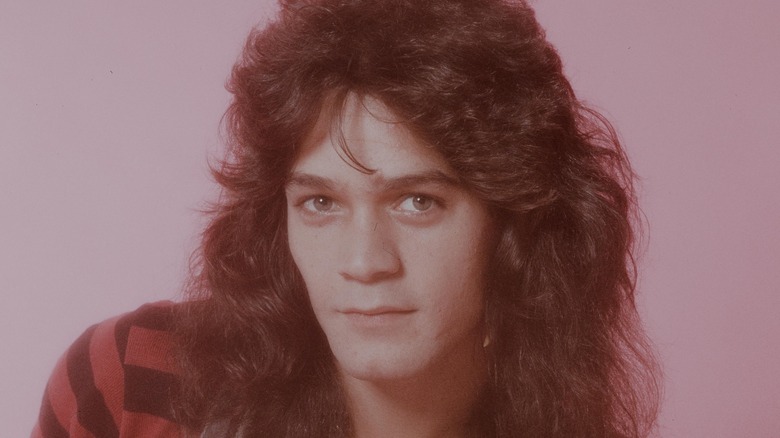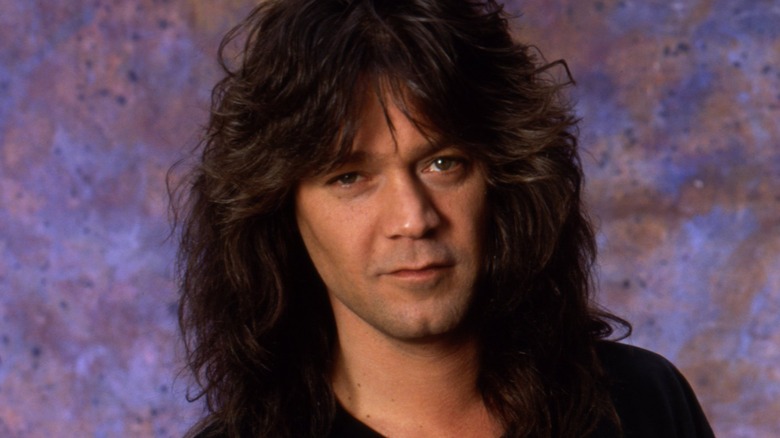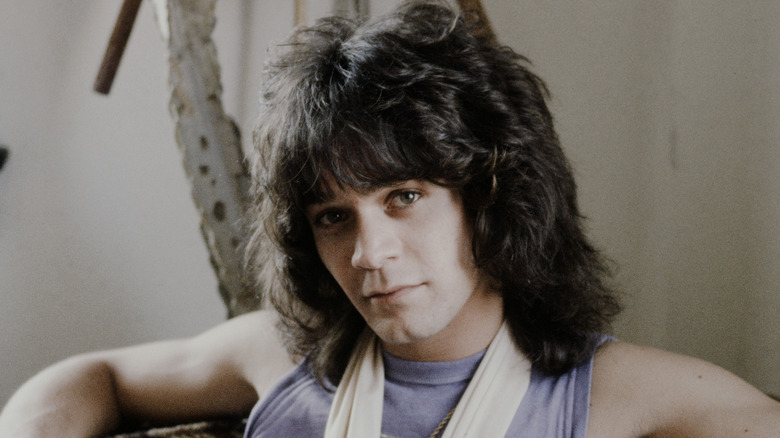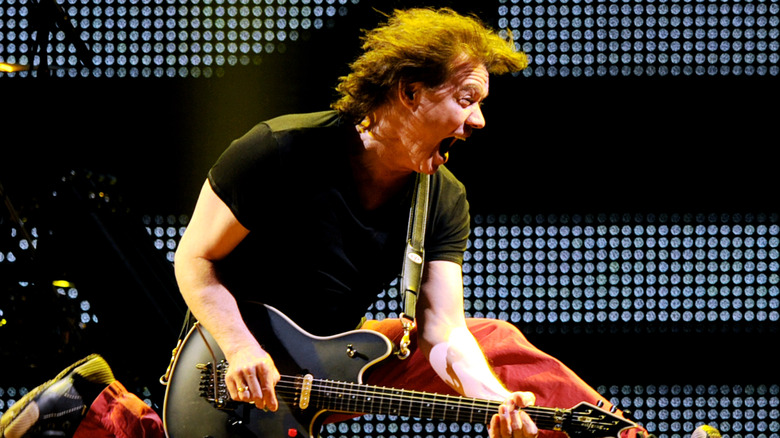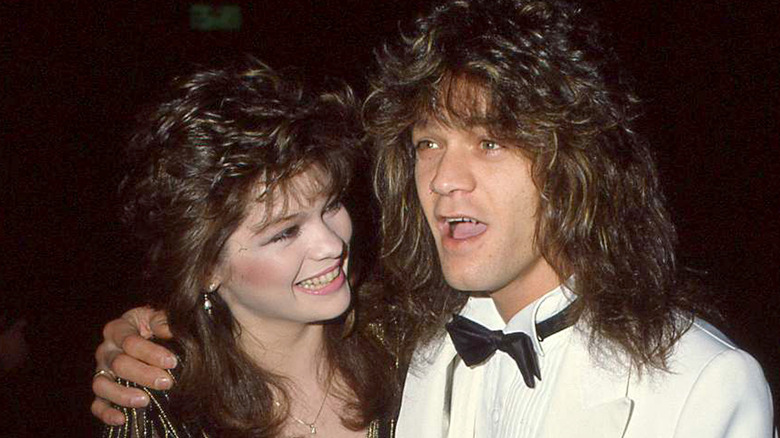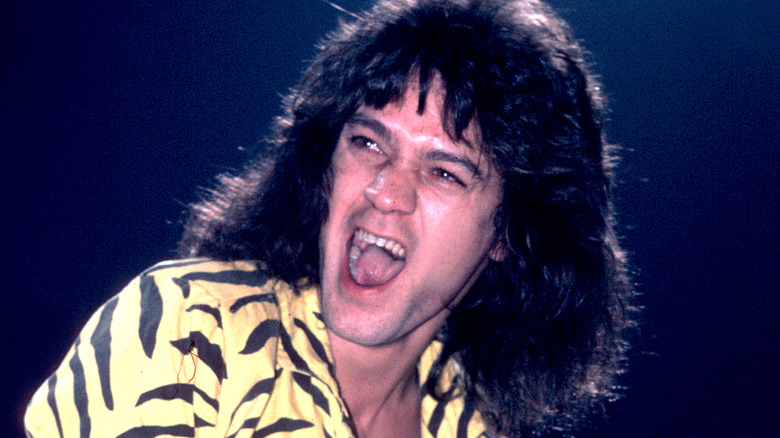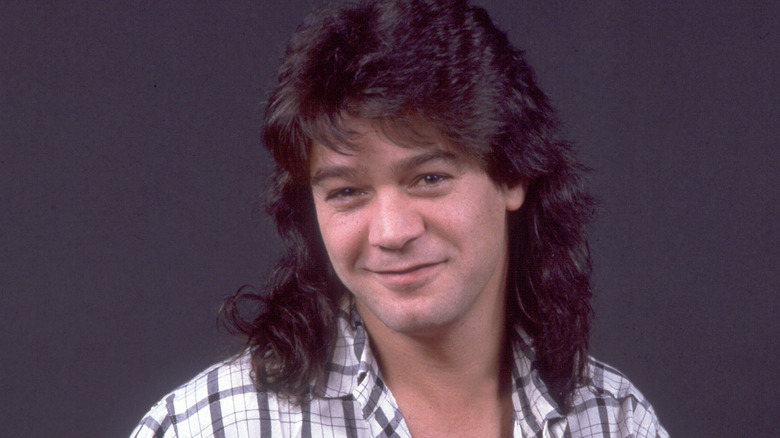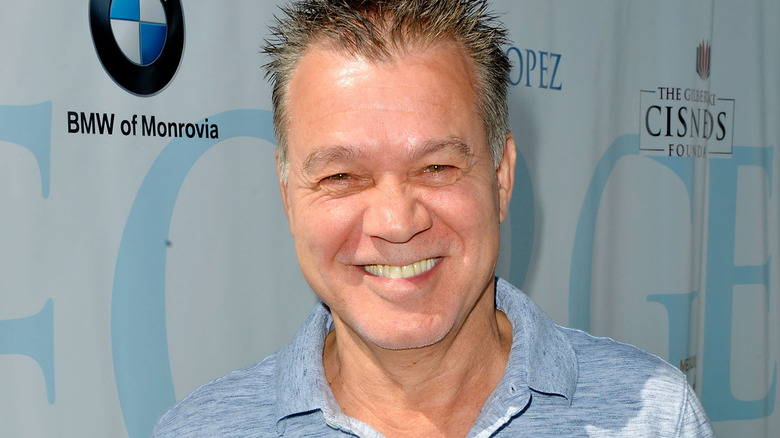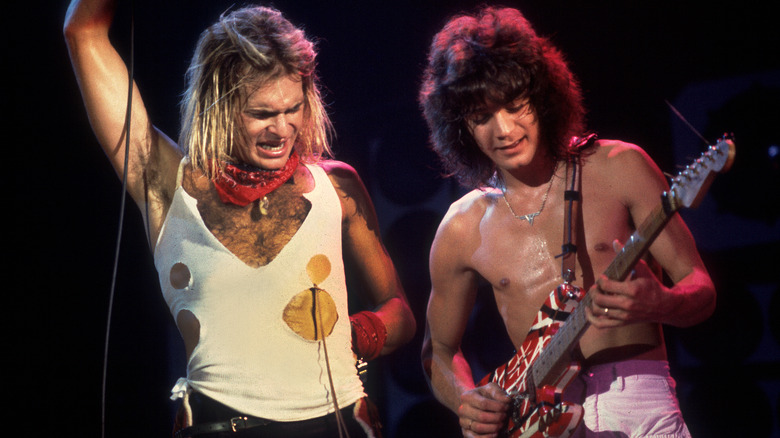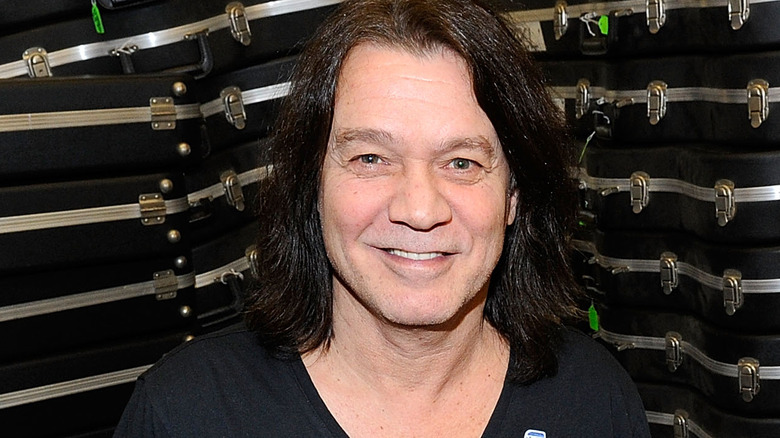The Tragedy Of Eddie Van Halen Explained
Eddie Van Halen, lead guitarist and namesake for the iconic hard rock band Van Halen and among the most influential musicians of his generation, suffered almost as many personal tragedies as he created classic riffs and songs. Van Halen's innovative two-hand tapping guitar technique made heavier rock faster and more melodic, and he weathered the controversy of his band navigating one of the most successful band member replacements ever, as well as one of the most unfortunate musician replacements in music history. Van Halen, the man behind the band, still went on to help sell millions of albums, chart plenty of hit singles, and get inducted into the Rock and Roll Hall of Fame.
As a matter of course for more than 40 years, Van Halen demonstrated superhuman-level guitar prowess on tracks like "Eruption," "Panama," "Jump," and "Runnin' with the Devil," but the musician was subject to the same human problems and complications of living as everyone else. Off the stage, off the wax, and off-screen, Van Halen consistently battled personal demons, serious health issues, relationship problems, and devastating career setbacks. Here's a look back at the troubled and tragic life of the late, great Eddie Van Halen, perhaps the greatest guitar player of all time.
The following article includes descriptions of addiction.
He experienced childhood bullying and discrimination
With sales of 80 million copies of its albums, Van Halen is one of the most successful American bands of all time, and that triumph is an American dream story — brothers Alex and Eddie Van Halen are immigrants, born in the Netherlands in the 1950s and settling in Pasadena, California, with their Dutch father and Indonesian mother when they were in elementary school. The Van Halen kids experienced racism both in the Netherlands and in the United States. Because of their mixed racial background, the Van Halens were cruelly and crudely labeled "half-breeds" by their peers in Dutch schools, Van Halen singer David Lee Roth told "WTF with Marc Maron" (via People). "Those homeboys grew up in a horrifying racist environment to where they actually had to leave the country," Roth explained.
Arriving in the U.S. in the 1960s, neither Eddie nor Alex Van Halen knew the language, which encouraged more racially motivated bullying. "I wasn't able to speak English and used to get my a** kicked because I was a minority," Eddie Van Halen told Rolling Stone in 1998. Attending a segregated school, Van Halen was ordered to study with Black students. "My first friends in America were Black," he told The Smithsonian (via NBC News). "It was actually the white people that were the bullies. They would tear up my homework and papers, make me eat playground sand, all those things, and the Black kids stuck up for me."
Eddie Van Halen coped with substance addiction
Eddie Van Halen's decades-long alcohol issues turned problematic when he was a teenager. Imbibing booze to curb performance anxiety during early gigs, Van Halen developed a dependency. "I was an alcoholic, and I needed alcohol to function," he told Billboard in 2015. "I got drunk before I'd show up to high school. My ninth grade science teacher, he could smell the alcohol, and he told me, 'Don't drink anything you can't see through.' And I was like, 'So, vodka?' And he said yeah. Which was great, because that was my drink," Van Halen added.
In the 1970s and 1980s, the band Van Halen kept up a routine of playing evening concerts and then partying into the night. Eddie Van Halen, meanwhile, would head back to his hotel room to work on songs while also drinking vodka and taking cocaine. "I would use them for work. The blow keeps you awake, and the alcohol lowers your inhibitions," he said.
The death of his father in 1986 prompted the guitarist to quit drinking, but the sobriety wouldn't last. The heavy consumption continued and affected Van Halen's personality. "Around 2004, I suppose I became a very angry drunk." Seeking help once more in 2007, Van Halen checked into a rehabilitation facility, and it was enough of an emergency that he missed his band's induction ceremony into the Rock and Roll Hall of Fame.
His father died from the effects of alcoholism
Just after the band turmoil surrounding the exit of David Lee Roth and the arrival of Sammy Hagar, Van Halen guitarist and drummer Eddie Van Halen and Alex Van Halen, respectively, suffered a tremendous personal loss: Their father died. The brothers were professional musicians, just like their father had been — Jan Van Halen played clarinet and saxophone in jazz and swing bands in Europe, the Dutch military's ensemble, and nightclubs in Southern California upon the family's immigration to the U.S. in the early 1960s. The older Van Halen performed professionally until 1972, when he lost a finger in a trailer-lifting mishap.
It's from Jan Van Halen that Eddie Van Halen believes he may have picked up the habits that led to his addiction issues — alcohol use was a stage-fright solution passed on from father to son. "When I started playing in front of people, I'd get so d*** nervous," Eddie Van Halen told Esquire. "I asked him, 'Dad, how do you do it?' That's when he handed me the cigarette and the drink." A heart attack struck Jan Van Halen in May 1986, and he died in December 1986 from complications of alcoholism, as implied by Eddie Van Halen. He was 66 years old.
He almost died from a rare disease
Early in 1988, Eddie Van Halen and his then-wife, actor Valerie Bertinelli, took a vacation to Turtle Island to commemorate their seventh wedding anniversary. At some point during the trip to the luxurious resort area near Australia's Great Barrier Reef, a mosquito bit Van Halen. He thought nothing of it, until after he returned home to Los Angeles and experienced a severe bout of fever. When the number reached 105 degrees, he sought treatment at Cedars-Sinai Hospital, where doctors diagnosed him with a rare tropical disease.
Briefly hospitalized, Van Halen made a full recovery from the seldom-diagnosed fever. His time in traction led to some lifestyle changes, too. "For some reason, that kinda made me look at things a little different, imagining being in there for an OD or alcohol," Van Halen told Rolling Stone. "It kinda wised me up. So I've been sober for 20 days. And I'm starting to feel the light at the end of the tunnel, starting to feel good."
He suffered from chronic pain issues
Eddie Van Halen wryly nicknamed the tour in support of the 1995 Van Halen album "Balance" the "Ambulance Tour," because he and his brother played many concerts while under physical duress. Drummer Alex Van Halen wore a neck brace to account for three cracked vertebrae, while Eddie Van Halen suffered from excruciatingly painful hip issues. The guitarist put off treatment for years, first mentioning his problems to the press after the 1996 MTV Video Music Awards, which included a reunion with former singer David Lee Roth that fell apart because Roth was annoyed that Van Halen talked at length about his hip. In late 1997, he canceled a scheduled hip replacement surgery because his doctor wanted him to wait and endure for a bit longer until a state-of-the-art artificial joint became available.
Finally, in November 1999, Van Halen got his new hip. At age 44, he was younger than the average hip replacement patient by more than 20 years. The new body part was especially necessary because of a diagnosis of non-traumatic avascular necrosis, an insane disease you definitely don't want. In necrosis, fatty patches develop, preventing blood vessels from accessing bone, which can lead to death of the bone. Van Halen didn't notice that anything was wrong until he quit drinking. "I probably wasn't feeling my hip going because of all the alcohol," he told USA Today.
His first marriage was fraught with infidelity and drug abuse
When he walked down the aisle in 1981, Eddie Van Halen was a rock star with a partner more famous than he was. Less than a year after they met backstage at a concert, Van Halen and award-winning "One Day at a Time" star Valerie Bertinelli got married. Drugs played a large role in the marriage even before it officially began, with the couple taking cocaine as they filled out a questionnaire from their wedding officiant, and then frequently throughout the relationship. Bertinelli would eventually quit cocaine, while Van Halen's drinking ramped up. "It was just bourbon, bourbon, bourbon. He'd be out on the road on tour, then come back home, burnt out and tired with nothing to say, except, 'Hey, I need a drink,'" a source close to the couple told People (via CNN).
The marriage also suffered under the weight of infidelity. "Yes, I did, four years into our marriage, cheat," Bertinelli told NBC's "Today." She told "The Oprah Winfrey Show" that she discovered evidence of her husband's cheating and unhappiness. "I heard him on the phone," she said, "and he was talking about how he just wanted out of the marriage." The couple separated in 2001, and filed for divorce in 2005.
Eddie Van Halen's 20-year-long cancer journey
Eddie Van Halen started smoking at the age of 12, and he'd become a habitual chain-smoker, inhaling one after another during recording sessions. In 2000, Van Halen was diagnosed with cancer of the tongue. To stop the spread of the disease, doctors surgically removed about a third of the guitarist's tongue, but the cancer would still move into his throat, and despite receiving a clean bill of health in 2002, he occasionally submitted to operations to have cancerous cells removed from his throat.
By 2015, Van Halen had quit smoking cigarettes in favor of vaping, an easier option after losing a large portion of his tongue. He also routinely traveled to Germany for experimental procedures and treatments related to his recurrent cancer diagnoses. Nevertheless, Van Halen didn't believe that smoking or vaping had anything to do with the disease affecting his mouth and throat — workplace hazards were to blame, he said. "I used metal picks — they're brass and copper — which I always held in my mouth, in the exact place where I got the tongue cancer," Van Halen told Billboard. "Plus, I basically live in a recording studio that's filled with electromagnetic energy."
He almost died from diverticulitis
After a hip replacement to stave off bone death, a cancer diagnosis, and a hospital stay for a rare fever, Eddie Van Halen faced another severe, painful, and prolonged health crisis in 2012. In August of that year, Van Halen was admitted to a hospital for emergency surgery to treat a serious case of diverticulitis. Presenting with symptoms including nausea, vomiting, fever, constipation, and unrelenting abdominal pain, diverticulitis occurs when pouches found in the large intestine grow inflamed and infected. Only the most advanced diagnoses, like the one Van Halen received, require emergency surgery to repair the intestinal pouches.
Because Van Halen needed surgery and as many as six months to recover, Van Halen the band had to cancel its remaining tour dates for 2012. Van Halen found himself laid up for even longer, when, during his recuperation, he broke some of his surgical stitches. That led to another infection in his intestine, requiring another hospitalization and another surgery, in which doctors removed the affected part of the guitarist's colon.
Eddie Van Halen died at age 65
While doctors pronounced Eddie Van Halen to be in remission, or free of cancer in 2002, the disease would return to spread and develop aggressively. In 2017, Van Halen learned that the cancer that had first taken root in his tongue had spread to his lungs and was categorized as stage IV, the most advanced form of the disease. "We got some good, livable years, but that was the beginning, I would say," Van Halen's son and bandmate Wolfgang Van Halen told The Telegraph. In 2019, the elder Van Halen was involved in a motorcycle accident, after which medical tests revealed that the cancer had spread into his brain. Over the next year, the cancer metastasized further, during which time he was hospitalized for intestinal problems and chemotherapy treatments. "So many different health issues stacked on top of each other. He just buckled under the weight of it all," Wolfgang Van Halen said.
On October 6, 2020, Eddie Van Halen died at Santa Monica, California's St. John's Hospital. Brother Alex Van Halen, his son, and his current and former wives were all present. Van Halen was 65. The official cause of death, according to the death certificate: a stroke, with pneumonia, a blood disease, and cancer all listed as contributing factors. Van Halen was 65.
His rivalry with David Lee Roth was never resolved
Multi-platinum bestsellers like "Van Halen," "Women & Children First," and "1984" made Van Halen one of the biggest bands on the planet from the late 1970s onward. That was threatened in 1985 when a core member departed. And the reason why David Lee Roth really left Van Halen? To pursue a solo career and acting. "The band as you know it is over," an angry Eddie Van Halen proclaimed to Rolling Stone in 1985. "Dave left to be a movie star. He even had the b**** to ask if I'd write the score for him. I'm looking for a new lead singer. It's weird that it's over. Twelve years of my life putting up with his bulls****."
The band brought in Sammy Hagar to sing, and the band continued on for a decade. When Hagar didn't feel like participating in a couple of recording projects, Van Halen invited Roth back. The reformed original lineup fell apart when Van Halen didn't like Roth's attention-getting preening during the 1996 MTV Video Music Awards, but the singer did take part in some tours in the 2000s. But that was just business. "We've never gotten along," Roth told "WTF with Marc Maron" in 2019 (per Metal Sucks). "We have always hated each other, right up until the last phone call." Roth agreed in an interview with Billboard, which he sat for just before heading out on tour with Roth: "He does not want to be my friend.
He had a falling out with his chronicler
Andrew Bennett is a filmmaker and photographer who specializes in musical acts. After stints documenting Katy Perry, the Jonas Brothers, and Deftones, Bennett was commissioned by Eddie Van Halen to record his life and creative process. He lived with the guitarist in 2006 and 2007, and while a proposed documentary film never came together, Bennett salvaged some of the material he collected into the self-published photography book "Eruption in the Canyon: 212 Days & Nights With the Genius of Eddie Van Halen." Despite the flattering title, the book gives an unflinching portrait of Van Halen, which includes Bennett's recollections of the musician's many binge-drinking nights and the time he treated to shoot the documentarian following a stressful encounter with his former bandmate David Lee Roth.
Bennett never received much of the $250,000 Van Halen promised to pay him, so, in another attempt to earn something for his efforts, he uploaded some of his footage to the internet in 2018. Van Halen filed paperwork to ask a judge to prevent the exposure of any more material, claiming full ownership of Bennett's film. "I'm more confused, disappointed, and hurt than angry," Bennett told Billboard. "Ed gave me his word. He saw how hard I worked and then he f***** me over. That's what shocks me. That's not the person I know. The depression from it is what kills me the most."
If you or anyone you know needs help with addiction issues, help is available. Visit the Substance Abuse and Mental Health Services Administration website or contact SAMHSA's National Helpline at 1-800-662-HELP (4357).

